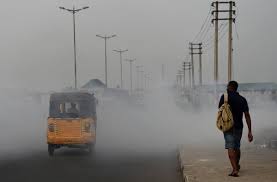
Delhi Activates Stage-III Air Quality Measures to Counter Severe Pollution
Confronting an alarming rise in air pollution, Delhi-NCR has now activated Stage-III of the Graded Response Action Plan (GRAP) as of 8:00 AM this morning, as mandated by the Commission for Air Quality Management (CAQM). This urgent step follows the Central Pollution Control Board (CPCB) recording a severe Air Quality Index (AQI) level of 424, highlighting serious health risks for residents.
The CAQM Sub-Committee convened to assess the deteriorating air quality situation across the region. During their review, they noted that although Delhi’s AQI briefly improved overnight, pollution levels have since stagnated, hampered by unfavorable meteorological conditions affecting large parts of the Indo-Gangetic Plain.
With continued heavy fog and other adverse weather patterns over areas including Punjab, Delhi, Haryana, and Uttar Pradesh, forecasts from the Indian Meteorological Department (IMD) and Indian Institute of Tropical Meteorology (IITM) indicate that air quality is expected to remain critically high in the coming days.
In response to this concerning forecast, CAQM has invoked Stage-III measures across NCR. This marks a later-than-usual activation in the winter season, as last year Stage-III was imposed earlier in November. The comprehensive Stage-III plan involves strict interventions to limit air quality deterioration, building upon the measures already active under Stage-I and Stage-II of GRAP.
Central to this phase are intensified road cleaning efforts, dust suppression strategies, and notable restrictions on high-dust construction and demolition (C&D) activities. While essential infrastructure projects such as rail, metro, hospitals, and national security projects are allowed to continue, they must strictly adhere to dust control norms.
Further restrictions extend to industrial operations, where all stone crushers and mining activities must halt. Vehicle restrictions also play a crucial role, with limits on BS III petrol and BS IV diesel vehicles in Delhi, Gurugram, Faridabad, Ghaziabad, and Gautam Budh Nagar. Additionally, inter-state buses that do not meet emission standards for EV, CNG, or BS-VI diesel will be restricted from entering Delhi.
The CAQM has advised NCR state governments to consider suspending physical classes for young students, up to Class V, by shifting them online to minimize exposure to harmful air. To supplement these restrictions, the CAQM is urging citizens to adopt pollution-reducing habits, such as carpooling, walking or cycling for short trips, and using public transport where possible. Households are also advised to avoid coal and wood burning, opting for cleaner electric heaters, especially in outdoor security posts during the winter months.
Dr. V K Paul, Member (Health) at NITI Aayog, underscored the critical nature of this situation, cautioning that severe AQI levels pose serious health risks, particularly to vulnerable groups. The CAQM has empowered Pollution Control Boards and local agencies to closely monitor and enforce GRAP measures, emphasizing the need for both government and public cooperation to curb this public health crisis. By working together, authorities and citizens alike hope to see pollution levels stabilize in the days to come, ensuring a safer environment for all.